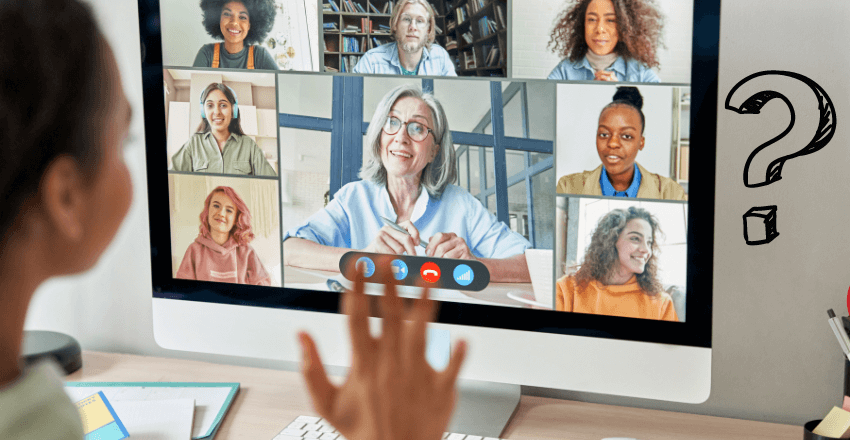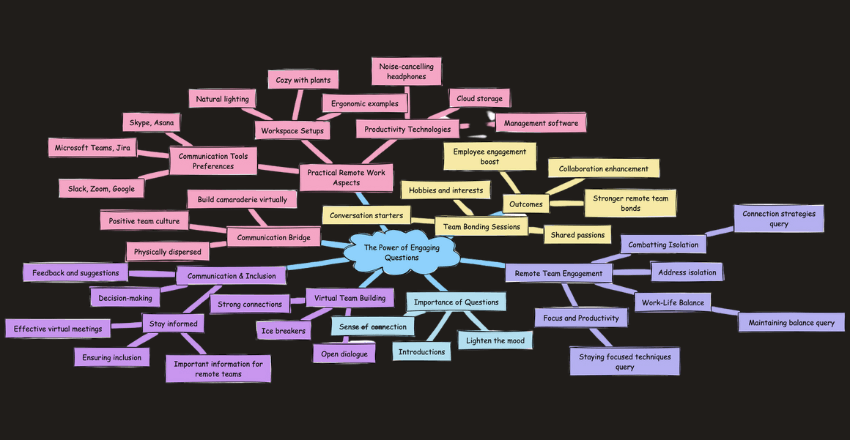Menu
March 18, 2024

Team Building Questions for Remote Workers can spark engaging conversations and foster a strong, connected remote work culture.
Is the traditional team-building approach falling short with remote workers?
Seeing the isolation and lack of camaraderie in virtual settings?
Let me share a game-changer for remote team building.
Table of Contents
ToggleRemote workers face unique challenges that can hinder team dynamics, making team building activities vital for fostering effective collaboration. Engaging questions play a crucial role in creating a sense of unity and connection among remote teams.
These questions can be used in virtual meetings or other activities to facilitate introductions, lighten the mood, and encourage open communication.
One of the key benefits of team building questions for remote workers is that they help break the ice and build rapport among team members who may never meet face-to-face. By asking about remote work habits, favorite hobbies or interests, and proudest professional achievements, remote workers can find common ground and form connections based on shared experiences and goals.
Moreover, team building questions can address the unique challenges faced by remote workers. By asking about feelings of isolation, difficulties in unplugging from work, and maintaining work-life balance, team leaders can identify areas where support or solutions are needed. These questions can also promote effective communication and inclusion, ensuring that remote workers feel informed and valued within the team.
Engaging questions help remote workers break down barriers and build trust, ultimately leading to a stronger team dynamic. By asking about dream professions and ambitions, remote team members can share their aspirations and motivations. This knowledge not only fosters understanding but also inspires and motivates the team as they work towards shared objectives.
Team building matters for remote workers as it helps overcome the challenges of remote work and fosters effective collaboration. Engaging questions enable remote team members to connect and build relationships, improving team dynamics and productivity.
By addressing topics such as work habits, hobbies, achievements, and challenges, team leaders can create an inclusive and supportive environment for remote workers. Through effective team building activities, remote teams can thrive and achieve success together.

Engaging questions hold the power to break the ice, encourage open dialogue, and foster strong connections among remote team members. When teams are physically dispersed, it is crucial to find ways to bridge the communication gap and build camaraderie virtually. By asking thoughtful and inclusive questions, remote teams can create a positive team culture and enhance collaboration.
One effective way to use engaging questions is during virtual team bonding sessions or coding team synergy discussions. These questions can serve as conversation starters, helping team members get to know each other on a personal level. For example, asking about hobbies and interests can reveal shared passions and create common ground. This knowledge can foster stronger bonds and facilitate more meaningful interactions within the team.
Engaging questions can be used to facilitate introductions, lighten the mood, and foster a sense of connection among remote workers.
Engaging questions also play a significant role in remote team engagement. Remote workers often face challenges such as feelings of isolation and difficulty unplugging from work. By asking questions that address these unique challenges, team leaders can show empathy and support for their remote team members. Questions about work-life balance, strategies for maintaining focus, or strategies for combating isolation can help remote workers feel understood and supported.
| Topic | Question |
|---|---|
| Work-Life Balance | How do you maintain a healthy work-life balance while working remotely? |
| Combatting Isolation | What strategies do you use to stay connected with your colleagues and combat feelings of isolation? |
| Focus and Productivity | What techniques do you find most effective in staying focused and productive while working remotely? |
Furthermore, engaging questions can be used to promote communication and inclusion within remote teams. By asking team members for feedback, suggestions, and opinions, remote workers feel valued and included in decision-making processes.
These questions can also help remote team members stay informed about company updates and initiatives, ensuring that they remain connected and engaged in their work.
To facilitate effective communication and foster inclusion, team leaders can ask questions such as:
Finally, engaging questions can extend beyond team dynamics and delve into practical aspects of remote work. Inquiring about workspace setups, preferred communication tools, and productivity-enhancing technologies not only helps remote workers feel supported but also provides insights into any challenges or improvements needed to better facilitate remote work.
| Workspace Setup | Preferred Communication Tools | Productivity-enhancing Technologies |
|---|---|---|
| Ergonomic desk and chair, dual monitors | Slack, Zoom, Google Meet | Project management software, time tracking tools |
| Standing desk, natural lighting | Microsoft Teams, Jira, Trello | Noise-cancelling headphones, task management apps |
| Cozy corner with plants, natural elements | Skype, Asana, Basecamp | Cloud storage, collaboration software |
Engaging questions have the potential to foster collaboration, boost employee engagement, and strengthen the bonds among remote team members. By using these questions strategically, teams can overcome the challenges of remote work and create a cohesive and productive virtual work environment.
Understanding each other’s remote work habits and routines is vital for effective teamwork and coordination among remote workers. By gaining insights into how team members structure their workdays, manage their time, and prioritize tasks, remote teams can optimize collaboration and ensure smooth project execution.
One virtual team bonding question that can shed light on remote work habits is: “What is your preferred work schedule or daily routine?” This question allows team members to share their unique approaches to organizing their workday and managing their time.
It can uncover interesting insights about productivity strategies, such as whether someone prefers to tackle complex tasks in the morning or if they find a specific work routine beneficial for maintaining focus.
An example of a remote team engagement question related to work habits is: “How do you maintain a healthy work-life balance while working remotely?” This question encourages team members to discuss the challenges they face in separating work and personal life when their office is just a few steps away.
It can lead to valuable discussions on tips and tricks for setting boundaries and maintaining well-being while working from home.
Another coding team connectivity idea is to ask: “What tools or techniques do you use to stay organized and manage your tasks remotely?” This question can uncover a range of productivity tools and project management methods that can benefit the entire team.
It is an opportunity to share best practices and explore ways to streamline workflows and enhance team efficiency.
| Benefits of Understanding Remote Work Habits |
|---|
| 1. Improved coordination and task allocation |
| 2. Increased productivity through shared strategies |
| 3. Enhanced work-life balance for team members |
| 4. The opportunity to optimize remote work tools and processes |
By asking virtual team bonding questions related to remote work habits and routines, remote teams can gain a deeper understanding of each other’s working styles and preferences.
This knowledge fosters empathy, improves communication, and creates a supportive environment where teammates can collaborate effectively and achieve collective goals.

Discovering and discussing personal interests and hobbies can enhance team cohesion and build stronger relationships among remote workers. By engaging in conversations about individual passions and activities outside of work, team members can develop a deeper understanding of one another and find common ground.
This knowledge and connection can foster a sense of camaraderie and promote collaboration, even when working remotely.
One way to encourage these discussions is by asking virtual team bonding questions related to personal interests and hobbies. For example:
“What are some of your favorite hobbies or activities outside of work?”
This question allows team members to share their personal interests and hobbies, whether it’s gardening, playing a musical instrument, or hiking. It opens up opportunities for colleagues to find shared hobbies or new interests, which can lead to bonding experiences outside of work projects.
Building on this, remote team engagement questions can also be used to explore further connections within the team. For example:
“Have you ever participated in team-building activities related to your hobbies or interests?”
This question encourages team members to share their past experiences with team-building activities, allowing others to gain insights and potentially spark ideas for future remote team bonding events. It further emphasizes the importance of integrating personal interests and hobbies into team-building efforts.
| Benefits of Discussing Personal Interests and Hobbies: |
|---|
| 1. Strengthen team relationships and foster a sense of unity. |
| 2. Find common ground and shared interests. |
| 3. Promote collaboration and creativity. |
| 4. Create opportunities for bonding experiences outside of work. |
By incorporating discussions about personal interests and hobbies into remote team dynamics, organizations can create a supportive and inclusive work environment where team members feel valued both professionally and personally.
This can lead to increased employee engagement, stronger teamwork, and ultimately, improved productivity and success for remote teams.

Acknowledging and celebrating professional achievements and goals can boost team morale and foster a sense of collective success among remote workers.
By recognizing and honoring individual accomplishments, remote teams can create a supportive and motivating work environment that encourages growth and collaboration.
One way to foster a sense of celebration is by asking team members about their proudest professional achievements. This not only highlights their accomplishments but also allows others to learn from their experiences. Sharing these successes can inspire and motivate the team, creating a culture of continuous improvement.
In addition to recognizing past achievements, it is equally important to discuss future goals. Asking team members about their aspirations and long-term career objectives promotes personal development and allows for the alignment of individual ambitions with team goals.
By regularly discussing professional achievements and goals, remote teams can create a sense of purpose and shared vision. This not only enhances collaboration and productivity but also fosters a positive and inspiring work environment for all team members.
Williams, S. (n.d.). BrainyQuote. Retrieved from https://www.brainyquote.com/quotes/serena_williams_913800
Uncovering dream professions and ambitions can spark meaningful conversations and cultivate a culture of support and encouragement within the remote team. By asking team members about their aspirations and long-term career goals, you create an environment that values personal growth and inspires individuals to reach for their dreams.
One way to foster these conversations is by asking questions such as:
These questions not only give team members an opportunity to share their dreams, but they also provide insights into their motivations and ambitions. This knowledge can help remote teams understand each other better and provide support as they work towards their shared objectives.
Discussing dream professions and ambitions within the remote team can create a sense of camaraderie and inspire collaboration. By encouraging team members to openly share their goals and aspirations, you foster a supportive environment where individuals feel valued and encouraged to pursue their passions.
As remote workers come together from different backgrounds and experiences, these conversations help build bridges and create common ground. They allow team members to connect on a personal level, forging deeper relationships and strengthening the overall team dynamics.
| Benefits of Discussing Dream Professions and Ambitions: |
|---|
| 1. Inspires personal growth and motivates individuals |
| 2. Builds trust and camaraderie within the remote team |
| 3. Fosters collaboration and encourages support |
| 4. Creates common ground and deeper connections |
By embracing the dreams and aspirations of your remote team members, you can cultivate a positive and encouraging work environment where everyone feels empowered to pursue their passions and achieve their professional goals.

Addressing the unique challenges of remote work through targeted questions can help remote teams find collective solutions and support each other effectively.
By asking remote team members about their experiences and perspectives, it becomes possible to identify and address common obstacles that arise in remote work environments. These conversations can facilitate a virtual team-building conversation that encourages collaboration and coding team connectivity ideas.
One key challenge faced by remote workers is the potential for feelings of isolation. By asking remote team engagement questions that encourage open communication and foster a sense of inclusion, team members can share their thoughts and experiences, helping each other feel connected and supported.
For example, questions such as “How do you manage to stay motivated and engaged while working remotely?” or “What strategies do you use to combat feelings of isolation?” can spark insightful discussions and provide valuable insights to tackle this challenge.
In addition to addressing isolation, remote teams may also struggle with the difficulty of unplugging from work. Remote work often blurs the line between work and personal life, making it challenging for team members to establish boundaries.
By asking questions about work-life balance and strategies for disconnecting, team members can share their approaches and offer valuable advice to others who may be struggling. This virtual team-building conversation can lead to coding team synergy discussions that support the well-being of all team members.
| Common Remote Work Challenges | Sample Questions |
|---|---|
| Feelings of isolation | “How do you manage to stay motivated and engaged while working remotely?” “What strategies do you use to combat feelings of isolation?” |
| Difficulty unplugging from work | “How do you establish work-life balance while working remotely?” “What strategies have you found effective in setting boundaries between work and personal life?” |
By actively addressing these and other remote work challenges through targeted questions, remote teams can foster a supportive and productive work environment.
Remote team engagement questions that promote open communication, virtual team-building conversations, and coding team connectivity ideas can help bridge the physical distance between team members and strengthen bonds. Ultimately, by overcoming these challenges together, remote teams can thrive and achieve their shared goals.

Promoting open communication and fostering a sense of inclusion through thoughtfully crafted questions can strengthen collaboration and team cohesion among remote workers. Engaging in meaningful discussions can help remote teams feel connected and valued, even when physically apart.
By asking questions that encourage feedback, collaboration, and transparency, team members can gain a better understanding of each other’s perspectives and work more effectively together.
One way to promote communication and inclusion is by asking each team member to share their thoughts on a particular topic. For example, asking remote workers about their preferred methods of communication and the challenges they face can provide valuable insights. This enables the team to identify common communication barriers and work towards finding solutions that meet everyone’s needs.
Another effective approach is to use questions that encourage remote workers to contribute their ideas and suggestions.
By asking for input on team decisions or project strategies, it shows that each team member’s opinion is valued and considered. This fosters a sense of ownership and empowerment, leading to increased engagement and motivation.
In addition to verbal communication, it’s important to create opportunities for written communication as well. Providing a platform, such as a shared document or messaging app, where team members can ask questions, seek clarification, and share information can help ensure that remote workers feel included and informed. Regular check-ins and updates can also help maintain a sense of connection and alignment within the team.
| Benefits of Communication and Inclusion |
|---|
| • Improved collaboration and problem-solving. |
| • Increased trust and transparency. |
| • Strengthened team cohesion and morale. |
| • Enhanced innovation and creativity. |
Promoting open communication and fostering a sense of inclusion through engaging questions is crucial for building strong virtual teams. By creating opportunities for team members to share their thoughts, contribute ideas, and seek clarification, remote workers can feel valued and connected to their colleagues.
This not only strengthens collaboration but also enhances team cohesion and morale, leading to improved productivity and success.

Gaining insights into remote workers’ workspace setups and tools used can provide valuable information for optimizing remote team collaboration and addressing potential limitations. Understanding how individuals create their work environment and the tools they rely on can contribute to creating a productive and efficient remote work culture.
When it comes to workspace setups, remote team members may have different preferences based on their work style and personal needs. Some may have a dedicated home office, complete with a desk, ergonomic chair, and natural lighting, while others may have adapted a corner of their living space or utilize a co-working space. These diverse setups offer a window into the varied ways in which remote workers create their work environment and find a balance between comfort and productivity.
Moreover, knowing the tools remote workers utilize for communication, project management, and collaboration can enhance team connectivity and streamline workflows.
From video conferencing platforms like Zoom or Microsoft Teams to project management tools such as Trello or Asana, understanding the tools used by team members can help identify any gaps in technology or areas where additional support may be needed.
| Workspace Setups | Tools Used |
|---|---|
| Dedicated home office | Slack |
| Adapted living space | Zoom |
| Co-working space | Microsoft Teams |
By fostering open conversations about workspace setups and tools used, remote teams can identify best practices and recommendations that can be shared among the team.
This exchange of information not only enhances team communication and collaboration but also ensures that everyone has the necessary resources to perform their work effectively.
By leveraging engaging questions and promoting team building activities, remote teams can overcome challenges, strengthen connections, and build strong virtual teams. Engaging questions play a crucial role in fostering collaboration and building a sense of unity among remote workers.
https://teambuilding.com/blog/virtual-icebreaker-questions
https://www.outbackteambuilding.com/blog/team-building-questions-icebreakers/
https://getlighthouse.com/blog/questions-remote-employees/
1. What questions can foster better connections among remote workers?
Ask about favorite work-from-home snacks. Inquire about the most challenging part of remote work. Discuss weekend plans. Snack questions lighten the mood. Challenges share struggles, offering support. Weekend plans reveal personal interests, building bonds.
2. How do these questions improve team dynamics?
Favorite snacks spark light, engaging conversations. Sharing challenges fosters empathy and support. Talking about weekends shows team members’ lives outside work, deepening connections. These discussions encourage openness, strengthening the team’s cohesion.
3. Are these questions suitable for all types of remote teams?
Any remote team can use them, regardless of industry or size. They’re universal, promoting human connections beyond work tasks. These questions help build a supportive and understanding team environment, enhancing overall team spirit.
Input your search keywords and press Enter.